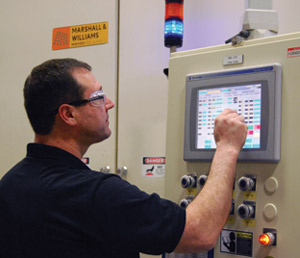

November 4 2021

At its main facility in Woonsocket, Rhode Island, Parkinson Technologies maintains a versatile pilot line with extrusion-casting & orientation capabilities, which we refer to as the pilot lab (also known as the BIAX Lab). This technology lab is a convenient and confidential place for our customers to conduct product and process development trials, create prototype films for testing and sampling to customers, and of course, gain hands-on experience with our equipment.
If you've never done a trial in our lab before, there are a few things you should know in order to be prepared for a successful run.
How much material should be sent for testing?
The amount of material you need to send to the lab depends on the type of trial you're conducting, as well as your goals for the trial. Product width, thickness, sample size, line speed, etc. all are factors. In general:
This doesn’t mean that we can’t work with significantly less material when only limited quantities are available, but especially for process development work where multiple variables may be explored, having ample material available to work with will ensure that you get the most out of your time on the pilot line.
How many people do we need to send for the trial?
Customers generally benefit the most from having at least one primary researcher (and optionally one or more technicians) on-site for the trials. We provide a minimum of two experienced technicians to operate the pilot line equipment, but customers are usually fully involved in the decisions made during the course of a trial and will want to observe the process in person. Having their own technician(s) present as well, allows customers to more efficiently collect, label, and test samples during the trial without distracting our operators from the task of running the line. Parkinson also does some toll work that requires no one from the customer end to be present during the run. In this case, our staff does all of the customers' QC work and produces their specified products.
How much detail do we have to provide to make sure you're able to offer a successful trial?
Parkinson has a pre-trial checklist that we'll send out to you before your trial and review with you prior to your arrival; this will help lay a good foundation and establish starting conditions for the trial. Providing us with a detailed DOE always helps ensure a more successful trial as well. In general, the more information a customer is willing to share, the more advice and assistance we will be able to provide.
What realistic goals should we focus on to maximize our trial?
There is a learning curve associated with conducting any trials and we work with you in advance to develop the most effective approach to achieving your objectives in our lab. As you become more familiar with our line, its capabilities and our process, future trials, if necessary, will become more focused and less preparation will be needed. But for your first trial, we suggest focusing on a few key variables. And again, creating a thorough run plan and completing the pre-trial checklist will position you for a productive test run.
Additional information important to the success of a trial.
A successful trial isn’t limited to the goals, pre-trial checklists, people, or the amount of testing material needed. It’s also essential to understand the safety concerns for the customer and the lab technicians. Therefore, a material safety data sheet (MSDS) should always accompany the material shipped to Parkinson’s facility. The MSDS lists the hazardous ingredients of a product, its physical and chemical characteristics (e.g. flammability, explosive properties), its effect on human health, the chemicals with which it can adversely react, handling precautions, the types of measures that can be used to control exposure, emergency and first aid procedures, and methods to contain a spill. When new regulatory information, such as exposure limits or new health effects information, becomes available, the MSDS must be updated to reflect it.
When it comes to using Parkinson's technology labs, our motto has always been "Walk before you run." There is a lot to learn before you can efficiently capitalize on the lab trial experience (in other words, patience is a virtue). In time, you'll be able to hit the ground running when you have a new product or process to evaluate.